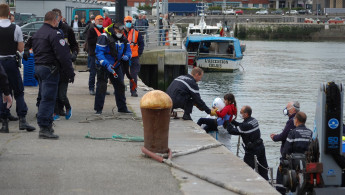31 die in deadliest migrant boat tragedy between France, UK
At least 31 migrants died Wednesday crossing from France to England when their boat sank off the port of Calais, French authorities said, the deadliest disaster since the Channel became a major part of the migrant route.
President Emmanuel Macron, saying France would not allow the Channel to become a "cemetery", vowed to find out who was responsible for the tragedy as prosecutors opened a manslaughter probe.
"It is Europe's deepest values -- humanism, respect for the dignity of each person -- that are in mourning," Macron said.
The French leader also called for an emergency meeting of "European ministers faced with the migration challenge", with his Interior Minister Gerald Darmanin urging a "tough international response".
Darmanin announced that four people suspected of being "directly linked" to the accident have been arrested.
Prime Minister Jean Castex is to convene several of his ministers for a crisis meeting early on Thursday, his office said.
French officials said earlier three helicopters and three boats had searched the area, uncovering corpses and people unconscious in the water, after a fisherman sounded the alarm.
The victims were among around 50 people aboard a vessel that had set out from Dunkirk east of Calais, according to the police.
On the other side of the Channel, British Prime Minister Boris Johnson said he was "shocked, appalled and deeply saddened by the loss of life at sea", following a crisis meeting with senior officials.
The disaster, the worst single loss of life since at least 2018 when migrants began using boats en masse to cross the Channel, comes as tensions grow between London and Paris over the record numbers of people crossing.
Britain has urged tougher action from France to stop migrants from making the voyage.
Pierre Roques, coordinator of the Auberge des Migrants NGO in Calais, said the Channel risked becoming as deadly for migrants as the Mediterranean which has seen a much heavier toll over the last years of migrants crossing.
"People are dying in the Channel, which is becoming a cemetery. And as England is right opposite, people will continue to cross."
According to the French authorities, 31,500 people attempted to leave for Britain since the start of the year and 7,800 people have been rescued at sea, figures which doubled since August.
In Britain, Johnson's government is coming under intense pressure, including from its own supporters, to reduce the numbers crossing.
Natalie Elphicke, the Conservative MP for the British Channel port of Dover called the sinking "an absolute tragedy" and demonstrated the need to stop the crossings at source.
"As winter is approaching the seas will get rougher, the water colder, the risk of even more lives tragically being lost greater," she said.
France's top maritime official for the northern coast Philippe Dutrieux told AFP in an interview last week that the numbers trying to cross had doubled in the last three months.
He blamed the "cynicism" of the traffickers "who throw migrants into the water as it is a business that makes money".
"It has been years that we have been warning about the dangers of the situation", said Charlotte Kwantes, head of Utopia56, an association that works with migrants in Calais.
She put at "more than 300" the number of migrants who have died since 1999 in the area.
"As long as safe passages are not put in place between England and France, or as long as these people cannot be regularised in France... there will be deaths at the border," she told AFP.
In Britain, the chief executive of the Refugee Council, Enver Solomon, said the deaths were "heartbreaking" and safe routes were needed for those "in desperate need of protection".
According to British authorities, more than 25,000 people have now arrived illegally so far this year, already triple the figure recorded in 2020.
The issue has added to growing post-Brexit tensions between Britain and France, with a row on fishing rights also still unresolved.





 Follow the Middle East's top stories in English at The New Arab on Google News
Follow the Middle East's top stories in English at The New Arab on Google News


